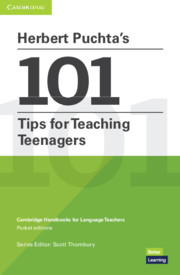 Herbert Puchta's 101 Tips for Teaching Teenagers
Herbert Puchta's 101 Tips for Teaching Teenagers Book contents
Why I Wrote this Book
Published online by Cambridge University Press: 28 October 2023
Summary
I have given seminars on teaching teenagers in a great many countries. At the start of these sessions, I normally ask teachers to engage in three rounds of reflection on their own work with teens. First, I ask them what they find rewarding about teaching teenagers. Typical answers colleagues have come up with include: the opportunities a teen classroom provides for them to respectfully influence young people's development; the fact that teens have general knowledge that teachers often don't (the latest trends in popular culture, for example); teenagers’ familiarity with modern technology; their spontaneity and the fun it can be teaching them; and the opportunity to talk about ‘real’ issues with them and challenge them by discussing solutions to real-world problems.
Following on from that, I ask the participants to list the challenges they regularly come across in their teen classrooms, to compare their answers in pairs and to categorise them. The outcomes of this second round are often amazing. My rough guess is that 90 percent of all the categories of challenges that teachers mention is not about language learning per se, or what is usually regarded as language teaching methodology. Rather, it is about the specific challenges presented by the facts that teenagers are going through a phase in their lives characterised by not just a desire to be different from parents and teachers, but also by their search for identity, and the worries, fears and insecurities that come with that. How should teachers cope with these challenges?
In a final round, I ask colleagues to list their specific questions about language teaching methodology in the teenage classroom. I usually get quite a few questions on how to teach the four skills, but also on how to help the learners apply efficient learning strategies and what we can do to help them become responsible adults who have learned to make optimum value-based decisions for themselves in life.
These fascinating and wide-ranging discussions with colleagues over the years have shaped the outline of this book. It is about the methodology of teaching teens – and here we are focusing on the teaching of the four skills. But also it is first and foremost about issues that go beyond language and that have a significant influence on learners’ willingness to learn, and the qualities and outcomes of their learning process.
- Type
- Chapter
- Information
- Herbert Puchta's 101 Tips for Teaching TeenagersCambridge Handbooks for Language Teachers Pocket editions, pp. ix - xiiPublisher: Cambridge University PressPrint publication year: 2020
